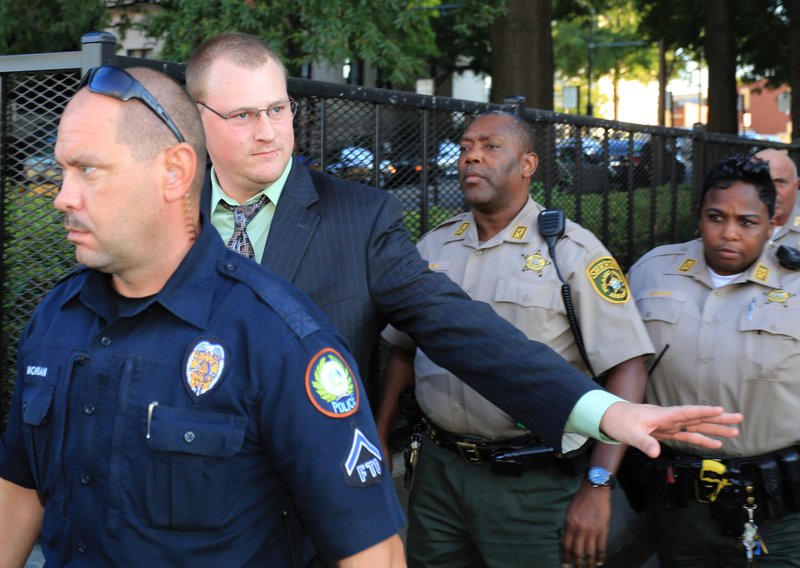A federal jury listened to closing arguments Wednesday in a trial against a former Little Rock police officer who killed a teen while responding to a burglary in 2012.
Chief U.S. District Judge Brian Miller has been presiding over the civil suit against Josh Hastings, who fatally shot 15-year-old Bobby Moore III on Aug. 12, 2012.
Hastings fired multiple shots at Moore while he was driving a Honda Civic during an investigation of car break-ins at the Shadow Lake Apartments, 13111 W. Markham St.
During the trial, lawyers have disagreed on the direction the car traveled — backward or forward — and its speed. Hastings reportedly told investigating officials he was standing by a dumpster with rocks at his back near a small embankment when the Civic came toward him.
The car was found more than 100 feet away, its front end facing the embankment and its backend resting against a 2012 Chevrolet Camaro, witnesses testified during the trial.
Josh Hastings criminal trials end in hung juries
• SEPT. 26, 2013: Hastings jury says it's deadlocked; judge declares mistrial
• JUNE 23, 2013: Hung jury mistrial for ex-Little Rock officer
• Photo gallery (larger versions)
• SEPT. 26, 2013: Hastings jury says it's deadlocked; judge declares mistrial
• JUNE 23, 2013: Hung jury mistrial for ex-Little Rock officer
• Photo gallery (larger versions)
In court Wednesday, Michael Laux, the lawyer for Sylvia Perkins, Moore’s mother, began by reminding the 11 jurors how they answered two questions during jury selection. Laux said he asked each of them: "Do you believe in personal accountability? And do you believe in the legitimacy of science?" Every juror told him yes, Laux said.
Later, Laux asked the jury to consider who Bobby Moore would have become if he had grown up. He likely would have done some time at a juvenile detention center, but his mom would have been able to visit him, the lawyer said.
Laux repeated he was not condoning what Moore and his two friends were doing that morning. “I would love to tell you he was out there selling raffle tickets. But he wasn’t."
The attorney also turned his attention to Hastings’ career history and told the jurists that the former officer had lied throughout his career. Those lies were deemed permissible because he was the son of a respected official at the Little Rock Police Department, Laux said.
“Mr. Hastings has never had to stand on his own two feet,” he said.
As Perkins’ lawyer spoke, Hastings sat stoically in a gray suit, occasionally shifting his position in his chair. His attorney, Keith Wren, objected when Laux brought up previous citations in Hastings' case file on the grounds that they were not entered into evidence during the trial. Miller allowed Vaux to continue speaking.
In his closing argument, Wren reminded the jury of statements made to law enforcement from the two young men who were in the car with Moore when he was killed. Wren said one of them, Jeremiah Johnson, told police immediately after the shooting that their car was going forward when shots were fired.
“That’s an unequivocal statement. And it’s not forced,” Wren said.
The other teen, Keontay Walker, told police he ducked under the dashboard and said the car hit the curb before it started moving in reverse, Wren said.
The things Walker and Johnson told police are in line with the physical evidence, Wren said. “It all lines up: His diagram, his testimony, Josh Hastings’ testimony and your common sense.”
Wren also called into question the testimony of Jeremy Cummings, an expert who was hired by Laux to review the case. Cummings had presented a diagram of the shooting that put Hastings 6.01 feet into the road, Wren said.
“This is absurd,” he said. “In order to make his theory work, he has to monkey with the evidence.”
Sylvia Perkins, Moore’s mother, filed the wrongful-death lawsuit against Hastings, the city of Little Rock and the Police Department's former chief, Stuart Thomas, in 2015, though Hastings is now the sole defendant. Hastings was criminally tried in Pulaski County Circuit Court twice. Juries deadlocked both times, leading the prosecutor to decline a third criminal trial.
The former officer was let go from the Little Rock Police Department after an internal investigation of the shooting.
Before opening statements began Wednesday, Miller ran the jury through a list of instructions. The burden of proof is on Perkins, the judge said. In order to side with the mother, her legal team must have shown a “preponderance of evidence” that Moore’s constitutional rights against illegal search and seizure were violated.
Vaux explained during his time in front of the jury that “illegal seizure” in this case refers to the seizing of Moore’s life.
The jury must judge Hastings’ decision to use deadly force against what a “reasonable officer” in the same situation would do, the judge said.
Miller said during a courtroom break last week that if Perkins wins the civil trial, the city and Thomas could again be defendants in a wrongful-death civil action, the Arkansas Democrat-Gazette previously reported. Perkins is seeking financial damages for loss of life and pain and suffering.
Read Thursday's Arkansas Democrat-Gazette for full details.
